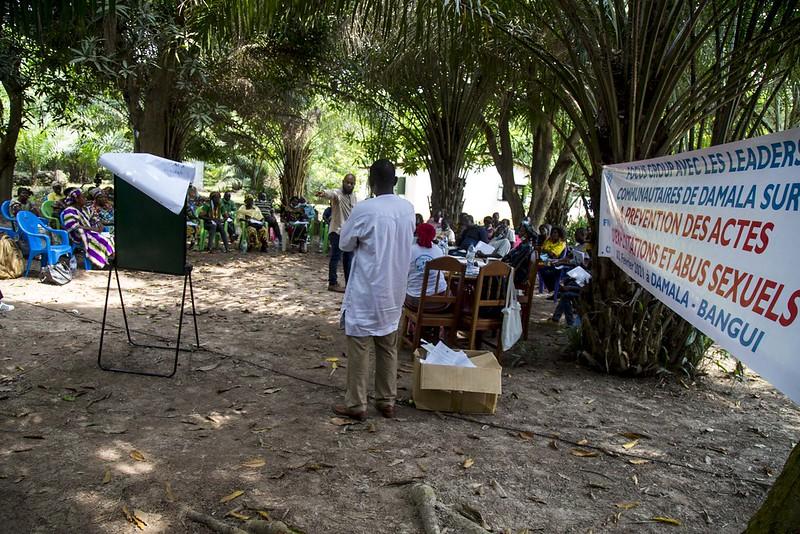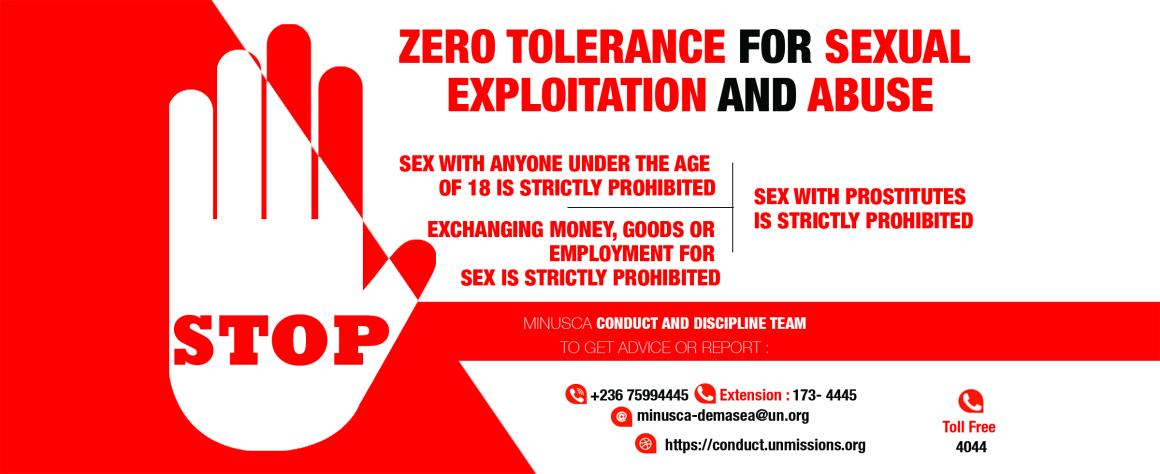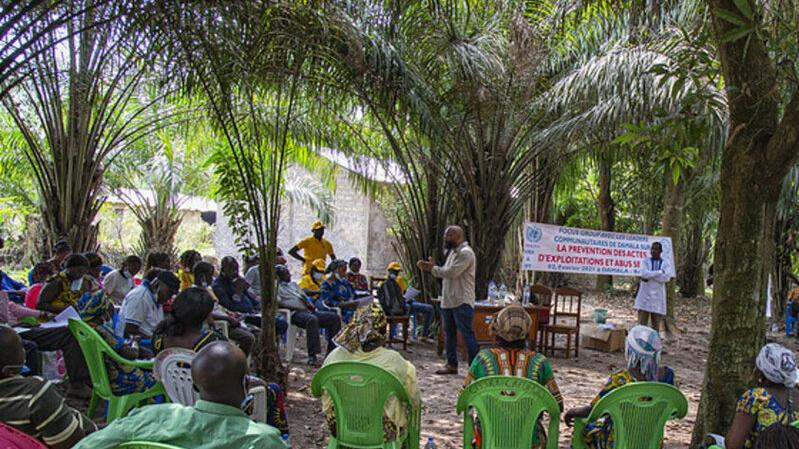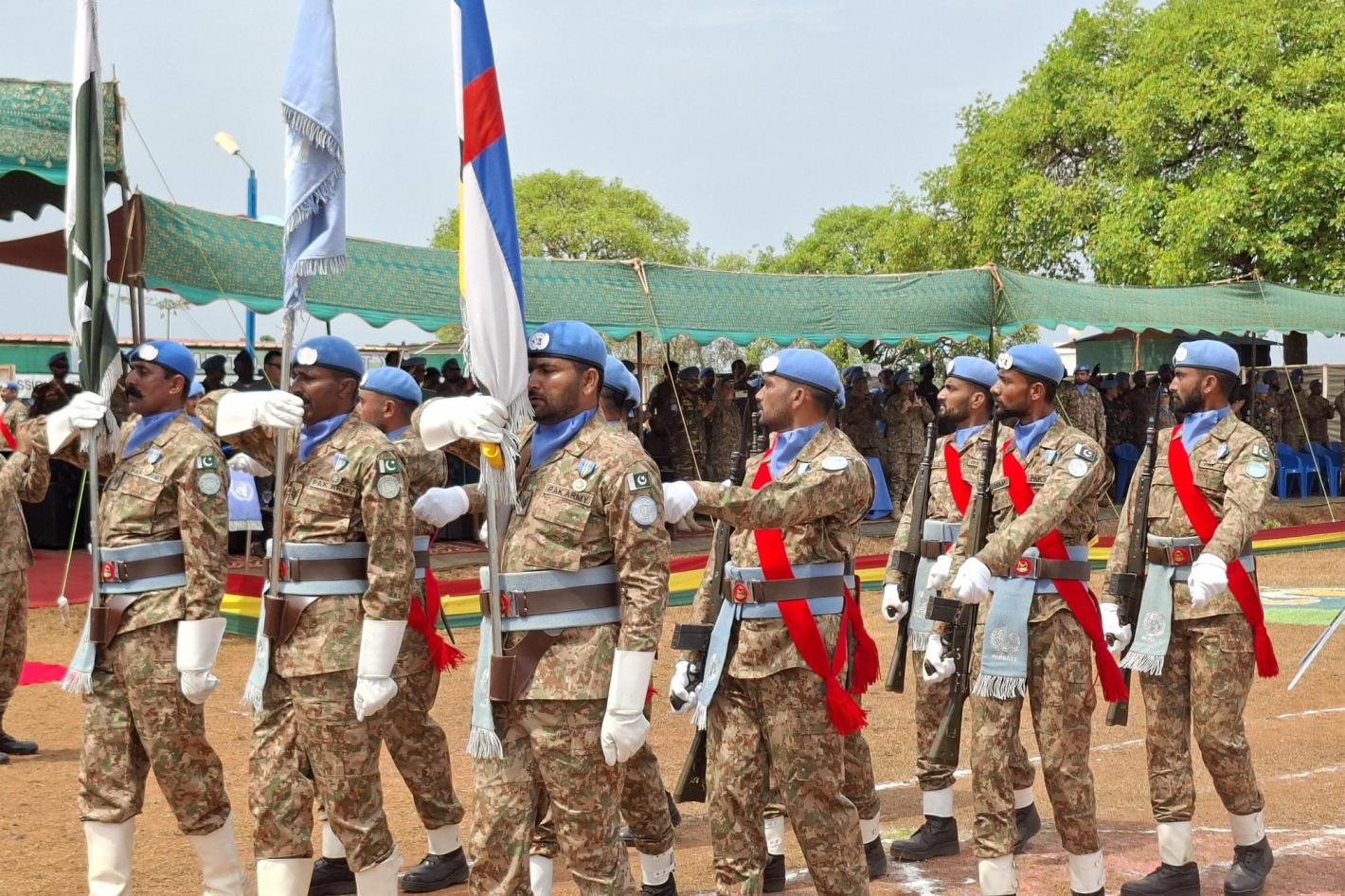For nearly a month, the MINUSCA Conduct and Discipline (CDT) team has crisscrossed several neighborhoods of Bangui – meeting with university and high schools students, a musicians’ group, human rights, civil society, youth and women’s associations, motorcycle cab drivers, gender-based violence service providers, journalists and media organizations as well as community and religious leaders – with one key message: preventing Sexual Exploitation and Abuse (SEA) by UN personnel.
About 30 educational talks have been held across the city – as part of a training series aimed at shining a light on the UN's zero-tolerance policy on sexual exploitation and abuse – organized from 12 January to 10 February 2021 in collaboration with the non-governmental organization ONYX Expertise International.
ONYX, a Mission partner working to prevent gender-based violence (GBV), sounded the alarm on several allegations of SEA and paternity claims it had received since the beginning of this year. Reason for MINUSCA to step up its awareness-raising activities on sexual exploitation and abuse, particularly among vulnerable communities in Bangui’s 5th arrondissement, Boeing, Combattant, Damala, PK5 and PK11 neighborhoods located close to UN camps.

What is sexual exploitation and abuse?
At one such session in Boeing, in front of an attentive audience of 50 community leaders, the MINUSCA Conduct and Discipline Officer, Alexandre Cudgenslhey, laid out what constitutes sexual exploitation and abuse, using real-life examples. The curious audience, that included police officers and religious leaders, posed a host of questions on channels for reporting suspected cases of SEA as well as on assistance for victims.
Cudgenslhey also serves as a Field Victims’ Rights Advocate (FVRA) – a focal point for victim support and assistance in the Central African Republic. The Mission’s CDT team also handles allegations of SEA involving mission personnel.
Any actual or attempted abuse of a position of vulnerability, authority or trust for sexual purposes, including for financial, social or political gain can be considered to be sexual exploitation. Sexual abuse comprises any contact of a sexual nature that is forced, coerced or unequal. The threat of such an act also constitutes sexual abuse, as does all sexual activity with a minor.
Participants are expected to raise awareness on SEA through their networks. “We hope to have a better impact through the transfer of knowledge to representatives of various groups, who must be involved in this fight in order to respond effectively and eradicate the plague of sexual exploitation and abuse,” emphasized Cudgenslhey.

Reporting sexual exploitation and abuse
Reporting suspected cases of SEA is a huge part of such work. Organizers encourage local communities to report any SEA allegations – to enable timely assistance for victims. Anyone can complain on behalf of a victim and reporting anonymously is an option, but it has to be done in good faith.
“As leaders, you represent the voice of the voiceless who may not know how to report or fear reprisals,” Cudgenslhey told the participants.
Members of Community Based Complaint Mechanisms (CBCM) also play a significant role. During the month-long campaign, they received training to strengthen their skills as focal points to whom SEA allegations can be referred. They also guide alleged victims to GBV partners for appropriate assistance through the Mission Hotline 4044.
“Manycases of sexual exploitation and abuse are not detected. We want to reinforce the capacity of leaders in order to obtain justice for victims,” said ONYX representative Aminata Kante.
The MINUSCA Conduct and Discipline officer stressed that the values of the UN are manifested through the conduct of its employees. “We have a standard of conduct that UN personnel must abide by ” , he said while giving examples of dos and don’t’s for UN civilian, military or police personnel.
Spreading the word on SEA
Sidoine Louisa Makanda, president of the association Wali Mo Londo Maï (women, rise up for development) said theeducational talk was an aha moment for her with regard to what is expected of UN personnel: “I thought they were free to do anything.” She added: “Many women lack knowledge on their rights, so we need to work closely with MINUSCA and ONYX to change this.”
Another participant, Alexandre Clement Houlman, said he would integrate what he had learned in courses given at the Boeing agro-pastoral cooperative and literacy centre where he works as coordinator: “The quality of the training was exceptional. It is important for us to know how to raise awareness in our communities, especially targeting women, girls and minors.”
“We expect participants to be involved in transmitting of messages on preventing SEA, especially to residents of communities neighbouring UN camps, so as to prevent cases of sexual exploitation and abuse involving UN personnel,” reiterated Cudgenshley. He noted that similar campaigns will be conducted in the sectors outside Bangui once the security situation returns to normal.
Addressing misconduct
In 2019, they were 80 allegations of sexual exploitation and abuse concerning UN personnel globally. The figure for 2020 was 61. UN actions in response to substantiated allegations of SEA include financial sanctions and separation from service. Disciplinary measures by Member States range from repatriation and dismissal to jail terms.
Over the past year, 92 communications on sexual exploitation and abuse were sent to Member States by the UN requesting action to be taken in relation to investigations or disciplinary proceedings – part of efforts to ensure accountability when UN and related personnel fail to observe the organization’s standards of conduct.






